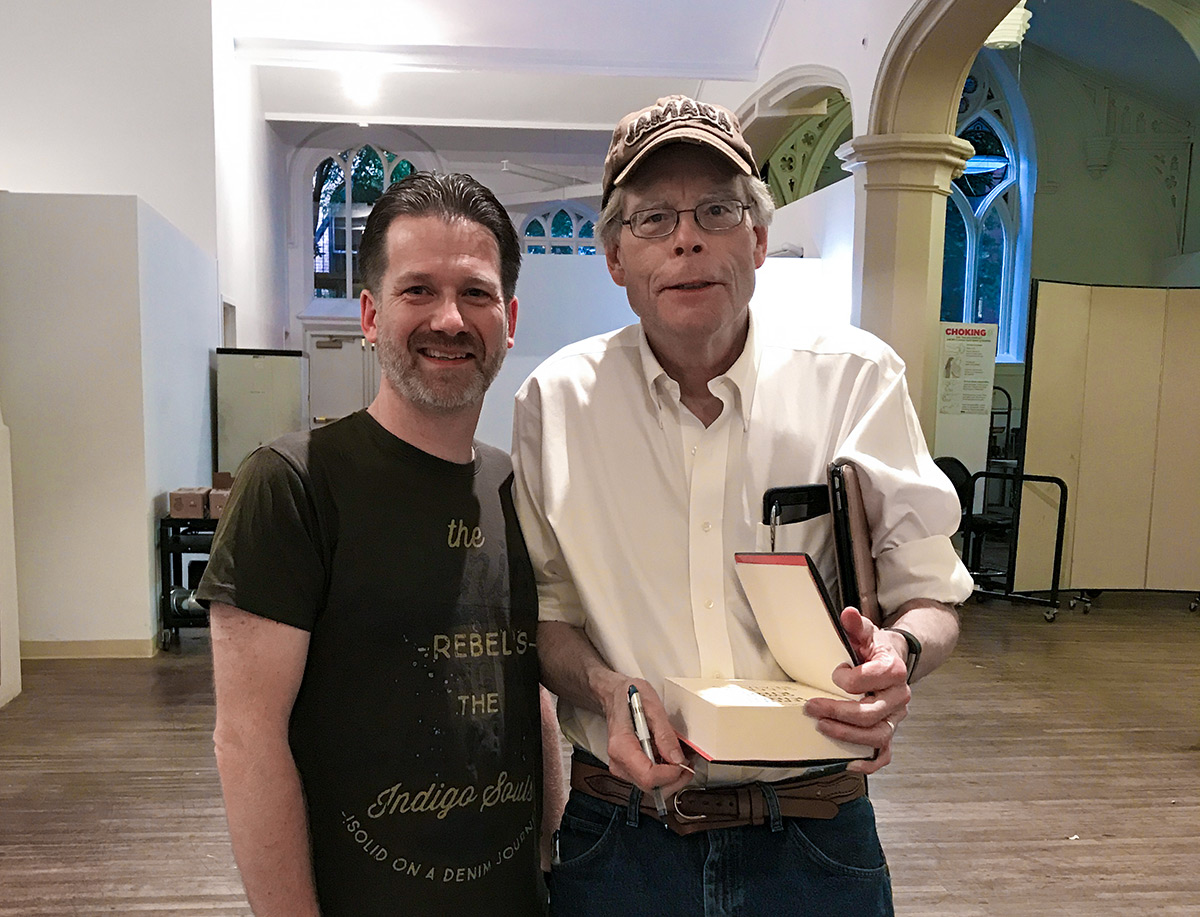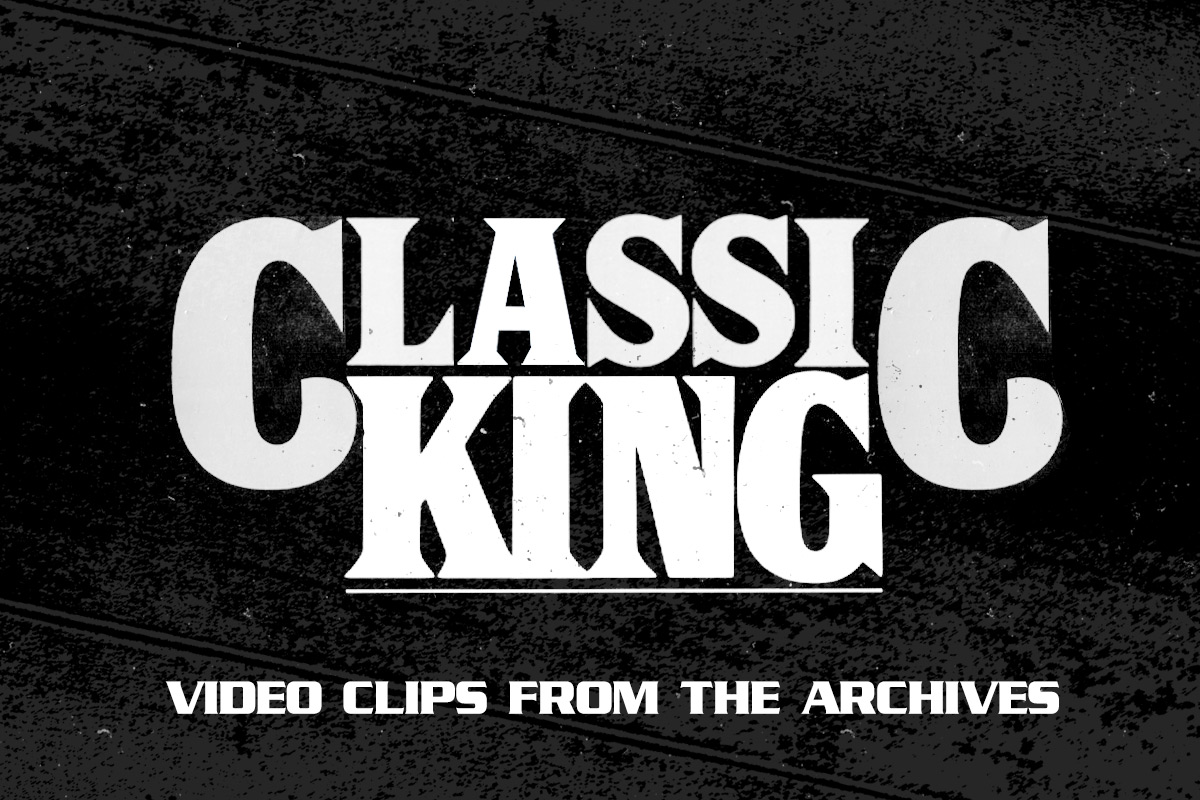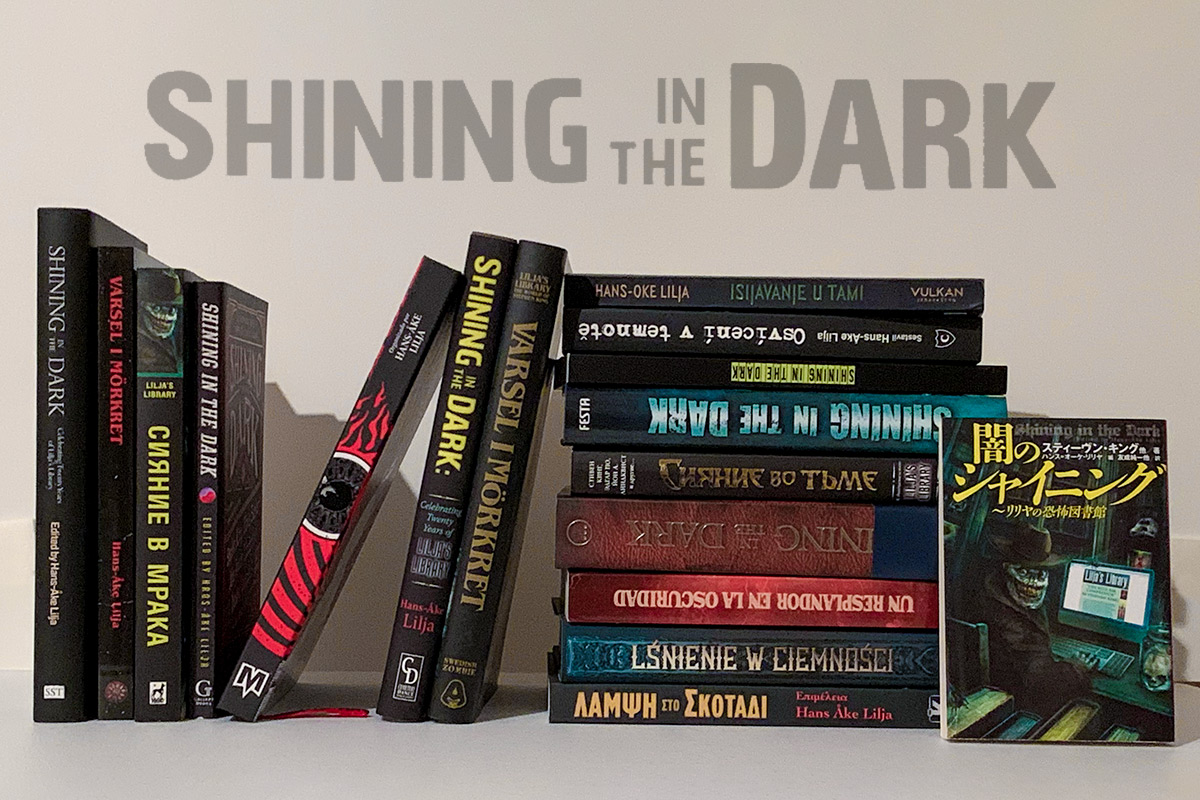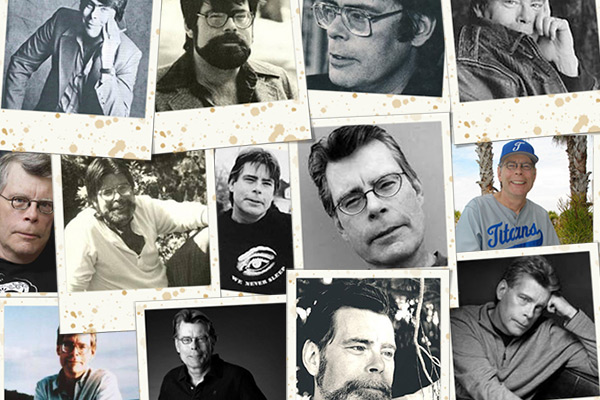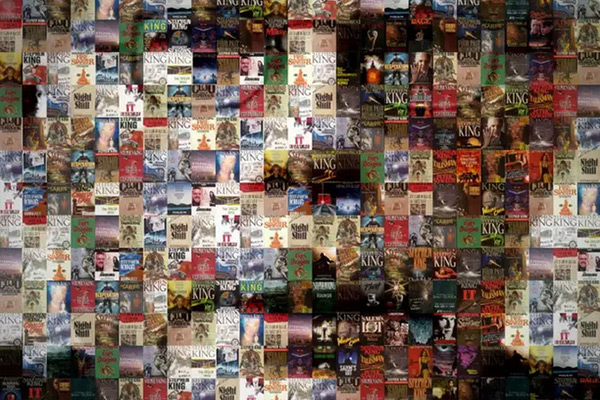Robin Furth
Posted: February 28, 2006
_
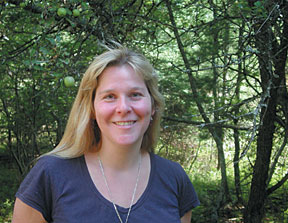 Lilja: Thanks for doing this interview. Can you please start by telling me a bit about yourself? You are a fairly anonymous person in the King community even though you have done a lot.
Lilja: Thanks for doing this interview. Can you please start by telling me a bit about yourself? You are a fairly anonymous person in the King community even though you have done a lot.Robin Furth: Thanks for the invitation to chat. So, where should I begin? (These kinds of questions are always the hardest.) I suppose a fundamental aspect of my personality is my love of books. I'm a fairly obsessive reader and writer. My favorite areas are poetry and supernatural fiction. My poetry has been published in magazines and journals in the US and the UK, but my fiction has yet to venture into the world. (I think it's a bit shy. I have a hard time coaxing it out of my folders and into an envelope.)
When I was a child my grandparents gave me lots of books. I loved C.S. Lewis's Chronicles of Narnia, a series which has recently gotten a lot of press because of the film adaptations done by Disney. My personal favorite was The Magician's Nephew, which - of all the books - explored travel between worlds most fully. Three other books that had a profound affect on me were Ursula LeGuin's The Wizard of Earthsea, a 1904 edition of Russian Wonder Tales, and The Complete Tales of Hans Christian Andersen. As you might have guessed given my approach to the Dark Tower books, I am also a great fan of myths and legends. When I was an undergraduate at the University of Pennsylvania, I almost became a folklore major. Since it was a real toss-up between literature and folklore, and since my parents feared that folklore would be an even less practical major than lit, I stuck to English. In retrospect I'm glad. As a folklorist you're supposed to approach your subject with a scientific detachment. I don't think I've ever been good at such detachment and wonder if it is even possible. (We humans are, I believe, profoundly subjective creatures.)
For me, and I'm sure it also holds true for many of the people reading this interview, books are literally doorways into other worlds. When I was a child I''d find that while I was reading fantasy I'd always have one foot in that land and one in this, the "real" world. Sometimes it got a little confusing because the "fantasy" world felt more real than this one. Ironically, what was probably a liability during my childhood became an asset as an adult. I don't think I could have written the Concordances without actually living in Mid-World for much of the time I was writing. I occasionally joke about being haunted by Roland, but it's a joke based on truth. All my life I've been haunted by characters, both my own and other people's.
As for the biographical details of my life, I grew up in Upper Darby, a town near Philadelphia, although I spent the majority of my summers on the Maine coast, at my grandparents' house. Though I spent most of my childhood in the States, I also lived for two years in Scotland - one year in Glasgow and one in a little village outside of Aberdeen. My love of the past, of the dream life, and of different cultures, was probably also affected by the fact that my paternal grandparents were from Eastern Europe and were old when I was born. During the First World War my grandfather served in the Austro-Hungarian army, and my grandmother trained as a doctor when few girls had any secondary education at all.
When I graduated from college, I won a scholarship to study English literature at the University of York in England. I studied English and American fiction written between the end of the Victorian period and the beginning of the First World War. Many of the great horror tales of our time were spun during this period - Dracula, The Strange Case of Dr. Jeckyll and Mr. Hyde, The Turn of the Screw, The Yellow Wallpaper, and The Picture of Dorian Gray, to name just a few. Just as important to me as the books I read was the medieval city of York. Perched as it is on its Roman foundations, it is arguably one of the most haunted cities in the British Isles, if not in all of Europe. While in York I saw my first ghost. (For those of you who are interested, it was an old tramp. He haunted a pub where I worked.) While doing my M.A. at York I also had the good fortune to meet my husband Mark, who was studying Romantic poetry.
After three years in England, Mark and I decided to move back to Maine. It seemed like an obvious choice at the time, since my grandparents had passed away, the house was empty, and Mark and I could live there while we tried to eke out a living as writers. As all writers and artists unfortunately discover, only a few make their living by their art, especially at the beginning. Mark was already a published poet, but there's little work going for poets these days. So, Mark started a creative writing grad program at the University of Maine at Orono (Steve King's Alma Matter). After working various jobs, I also decided to return to UMO to get my teaching certificate. We both taught in Maine for about ten years. (I taught in middle schools and high schools; Mark taught at college.) In the fall of 1998, Mark and I returned to the University of Maine to start PhD work.
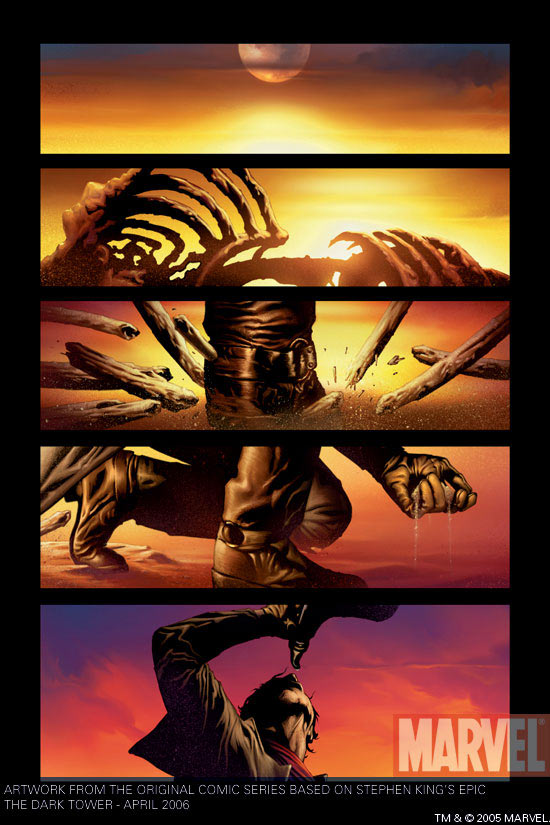 Lilja: How did you get involved with Stephen King and The Dark Tower saga? I read that it was originally only intended for making sure Stephen kept to the truth of the story while writing the last three books.
Lilja: How did you get involved with Stephen King and The Dark Tower saga? I read that it was originally only intended for making sure Stephen kept to the truth of the story while writing the last three books.Robin Furth: As I said above, in the late 1990s I was at the University of Maine doing work towards an individualized PhD in supernatural fiction. One of my supervisors was Burt Hatlen, who had been one of Steve's teachers and was still one of his friends. Burt knew I was a serious writer and that I really loved horror stories, and so when Steve told him that he was looking for someone to do some occasional work, Burt recommended me. (Boy, am I in that man's debt!) The first thing I did for Steve was sort through the thousands of stories he received for On Writing. It was an amazing job, because I also got to look at the stories as I sorted through.
After I finished that short-lived assignment, I went into the Bangor office to pick up some paperwork. It was the winter solstice of 2000. Our part of Maine had just suffered one of the worst ice storms in history and so I'd been without power for a week. Needless to say, despite my best efforts I was feeling pretty grubby. Anyway, I ran into the office at about 4:00 to pick up my paperwork and to chat with Marsha (Steve's personal assistant) before she closed shop, and who should be sitting there but Steve King - the man himself! I hadn't met Steve in person yet, and was extremely embarrassed that I should meet him when I felt like such a mess. He obviously wasn't bothered by my appearance (maybe he'd lost power too) and he asked me if I wanted some additional work. Of course I said yes.
What Steve asked me to do was to make lists of all the characters and important places in the first four Dark Tower books, and to write down the pages where he could locate them. I hadn't read Steve's Dark Tower saga at that point, but I was a real fan of his other fiction, so I was excited about the job. I don't think Steve had any idea what he was getting into at that point. (Never ask a frustrated folklorist to map out your imaginary world - you will get a huge tome!) Anyway, I did what Steve asked, but I couldn't resist putting in commentary as well. I also started to collect lists of Mid-World games, Mid-World sayings, and Mid-World gods. Before I handed in the final project I had it bound. The cover page was a door with a sigul on it, just like the one at the front of the first Concordance. However, the door on Steve's book was two-sided; in other words, once you turned the page you could see the back of the door (including the reversed sigul) to show you that you really had entered Mid-World. (The UK version of the Concordance has a two sided door, which is really fun.) To the front of this proto-Concordance I taped a key, so that Steve would be able to unlock the magical door. Steve must have liked my silliness because after that he handed me his manuscript in installments so that I could continue expanding the Concordance.
While Steve was working on the final three Dark Tower books, and while I was expanding the Concordance, we started to have a really good email conversation. Obviously, we were both living in Mid-World, so our conversations were about that. Occasionally Steve would hit a stumbling block in his writing and I'd receive a question like, "Robin, what does Jake have in his backpack?" My first reaction would be panic. I had no idea. But then I'd go back through the books, paying special attention to what Jake shoved into his bag and what he took out, what he kept and what he lost. There were many other such brain-teasers, the result of which is that I know the Dark Tower books inside and out.
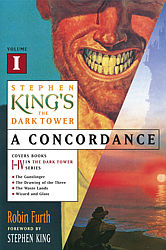 As well as doing Dark Tower research, I occasionally did other bits and pieces for Steve. One of my favorites (believe it or not) was going through the New York Public Library archives to find articles about the trial of Albert Fish, the child-eating cannibal that Steve King and Peter Straub referred to in Black House. I think I have a pretty sick sense of humor sometimes, because right next to a particularly gruesome article about Fish's exploits was a cartoon-advertisement for some sweets which really caught my eye. It featured chubby children feeling each other's muscles while eating "Dresden-Style" chocolates. Well, it was too much for me, so when I handed in that bit of research I included the advert at the front with the words "Albert Fish's favorite dishes" written all around the edges. I knew at the time that it was a kind of risky thing to hand to your boss - I figured that Steve would either laugh or fire me on the spot. Luckily, he thought it was darkly humorous.
As well as doing Dark Tower research, I occasionally did other bits and pieces for Steve. One of my favorites (believe it or not) was going through the New York Public Library archives to find articles about the trial of Albert Fish, the child-eating cannibal that Steve King and Peter Straub referred to in Black House. I think I have a pretty sick sense of humor sometimes, because right next to a particularly gruesome article about Fish's exploits was a cartoon-advertisement for some sweets which really caught my eye. It featured chubby children feeling each other's muscles while eating "Dresden-Style" chocolates. Well, it was too much for me, so when I handed in that bit of research I included the advert at the front with the words "Albert Fish's favorite dishes" written all around the edges. I knew at the time that it was a kind of risky thing to hand to your boss - I figured that Steve would either laugh or fire me on the spot. Luckily, he thought it was darkly humorous.Lilja: How did you feel when it was decided it was going to be published?
Robin Furth: As you can imagine, I was thrilled. I was really hoping that the Concordance would someday make it out to the larger world, but I didn't know how that would happen. I think I'd been compiling for about two years when I got a phone call from Ralph Vicinanza, who is one of Steve's agents. He thought that there would be an audience for the book, and so asked me to send him what I had done so far. I quickly sent him a copy and kept my fingers crossed. Ralph liked what he saw. Scribner made an offer - they wanted to publish the book in two separate volumes, one covering books I-IV, the next covering V-VII. In the end, I had to expand each volume since (as Steve has said) they were written for his use only, and they contained many short-hand references to issues that had come up during our conversations.
Lilja: Had you read The Dark Tower books or any other King book for that matter when you started working on the Concordances?
Robin Furth: I'd never read the Dark Tower books; however I'd been a fan of Steve's other novels for quite a while. I'd read Salem's Lot as a kid and absolutely adored it. (I have a soft spot for vampire tales.) I felt the same about his other stories, many of which deal with psychic ability - a subject that fascinates me. Believe it or not, my ambition at the age of fourteen was to grow up and work with Stephen King. Well, I guess some dreams do come true!
Lilja: How did you go by writing the concordances? Did you read it all first or did you write as you read? After all, The Dark Tower saga isn't read in an afternoon.
Robin Furth: To create the proto-Concordance which I sent to Steve I had to read each of the Dark Tower books from cover to cover about four or five times. (First for plot, second for characters, third for places, fourth for language/ games/ historical characters.) While adapting the Concordances for publication I probably read them an additional three times since I had to get page references for the UK Concordances as well as the US editions. While going through the books and taking notes I had to stop every 100 pages or so to type references into my computer file. Otherwise my notes became too unwieldy.
Lilja: I bet there when things that was unclear when you read the book, right? How much in those cases did you decide for yourself what was correct and how often did you ask Stephen?
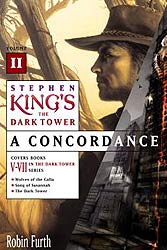 Robin Furth: Even now, as I write the storylines for Marvel comics, I try to run my Dark Tower theories by Steve. I think that's only fair, since Mid-World is his world. (He's on the white charger up ahead, I'm on my rotund little donkey behind him, pencil and paper in hand!) As I've said already, I really love folklore, so some of the sub-stories which the Dark Tower cycle contains resonate with old myths. Hence, I can fill in many of the blanks because those same stories appear the world over, but in slightly different guises. I think that's part of the appeal of the Dark Tower books. I know it is for me.
Robin Furth: Even now, as I write the storylines for Marvel comics, I try to run my Dark Tower theories by Steve. I think that's only fair, since Mid-World is his world. (He's on the white charger up ahead, I'm on my rotund little donkey behind him, pencil and paper in hand!) As I've said already, I really love folklore, so some of the sub-stories which the Dark Tower cycle contains resonate with old myths. Hence, I can fill in many of the blanks because those same stories appear the world over, but in slightly different guises. I think that's part of the appeal of the Dark Tower books. I know it is for me.Lilja: Will there be one volume of the concordance? There are quite a few listings that appear in both volumes so I imagine it would be a big job to get them combined into one volume, right? And if done it would be a really big book!
Robin Furth: Yes, there's going to be a single volume Concordance coming out either in late 2006 or perhaps early 2007, I'm not certain which. (I've started work on it already and I must admit it's a pretty daunting task.) Since, as you say, just pasting the two books together would mean a lot of repetition, I have to go through and edit the text while compiling the page references. I'm really hoping my computer doesn't crash due to the size of the documents it's dealing with.
Unlike the two-volume set which (except for the UK edition) only appeared in paper back, the single volume Concordance will also be in hardback. Scribner is still going to publish the paperback but Cemetery Dance is going to publish a limited edition hardback. I'm not sure yet whether a single volume Concordance will come out in any other country.
Lilja: I read that you will outline The Dark Tower comic book series, providing scene-by-scene plotting, and maintaining the continuity and consistency of each story arc. What does that mean exactly?
Robin Furth: It means a lot of work, but I must say it is fascinating work. Basically, I'm writing the storylines for the comics. I'm not certain how other writers handle this kind of thing, but what I'm doing is constructing a series of stories which, when taken together, make up a five chapter visual novel. (The first chapter recounts the events of Wizard and Glass, the second describes the adventures Roland and his friends encounter on the way back to Gilead, etc.)
However, as in film or any other visual medium, my plots are just the beginning. The stories are then adapted and reworked by the other artists working on the project. Once I finish with my plots I send them on to Ralph Macchio, the Dark Tower editor at Marvel. He and two other editors go over what I've done. If they like the work, they keep it. If they think the plots need more changes, they send the storylines back with suggestions. Once the storylines go through this rigorous process and meet with approval, they are handed over to Jae Lee, who does the line drawings. (By the way, I've seen some of Jae's drawings for the first issue and they are superb.) After Jae is done, his drawings go to a colorist. The final work (besides that done by the artist who writes the physical words on the page) will be the scripting. (In other words, the word balloons and commentary that you see when you read the comics.) I don't think Marvel has made a final decision yet about who will script.
As you can imagine, it can be nerve-wracking trying to adapt another writer's stories to a new medium, but so far Steve has been very supportive of the work I've done. I guess I've worked on the project with him for so long that I've served a fairly exacting apprenticeship. I do believe that I am now a naturalized citizen of Mid-World.
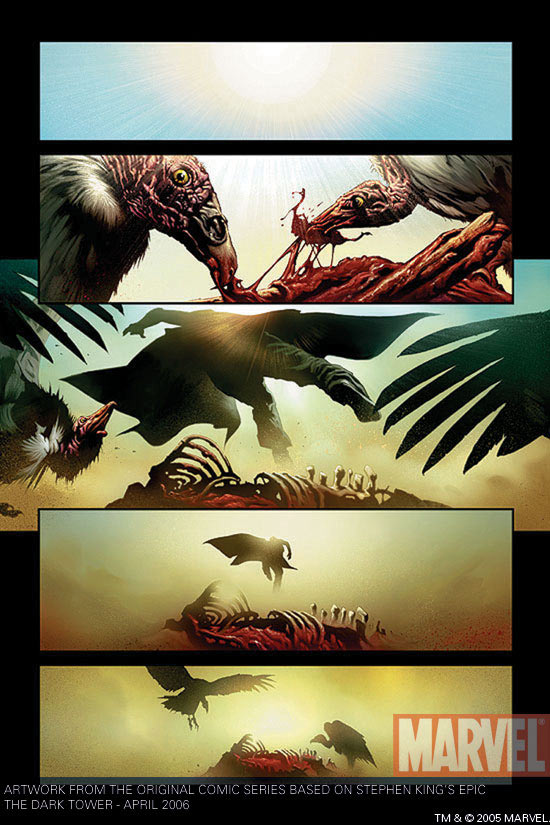 Lilja: Can you tell me more about the comics? Any plot info, will there be more then the initial six?
Lilja: Can you tell me more about the comics? Any plot info, will there be more then the initial six?Robin Furth: The first seven comics (which will eventually be published as a single volume) are a retelling of Wizard and Glass. As you can imagine, it was really difficult to take such a complicated tale and cut it back to a story that could be contained within seven comics of roughly twenty-five pages each! Unfortunately it meant leaving out quite a few secondary characters as well as many of the plot's twists and turns, but I did my best to catch the essence of the story, if not the exact detail. At times I had to alter the plot a little to fit within the parameters of the new form, but hopefully they remain really true to the heart of the tale.
The rest of the comics (there will be thirty in all) cover the time period between Roland leaving Hambry and the fall of Gilead. The later comics are in some ways the hardest, because I have to go back to my Dark Tower timeline and to my many notes to expand upon the childhood/adolescent adventures that Roland mentions in the books.
As well as writing the plots, I'm also writing some Mid-World legends. (I've bounced these off Steve, so they're consistent with his vision.) The first one is about the origin of the Wizard's Rainbow and was great fun to write. There will be lots of others too. I'm also mapping the baronies of Mejis and New Canaan (don't worry, the Marvel artists are going to draw them based on my descriptions - I won't draw them myself!) So, it should be a lot of fun.
Lilja: I imagine that this is something you will work with for quite some time, right? Are you working full time for Stephen King at the moment or are you doing other things as well?
Robin Furth: I still do freelance work for Steve (the most recent being some research for Cell), but the majority of my work right now is being done for Marvel and Scribner. The comics will probably keep me pretty busy for much of the next year as will the single volume Concordance. I'm also finishing up my second novel which I really hope I can coax into an envelope and out to my agent and then a publisher over the next twelve months or so. In addition I have several batches of poems that I have to get in the mail, so there's never a dull moment. (There's rarely enough sleep either, but in that I'm in the same boat as everybody else.) Over the past few years, my life has gone through a lot of changes, thanks to Steve and Roland. I feel very lucky. Hopefully, the changes will continue in a creative direction.

